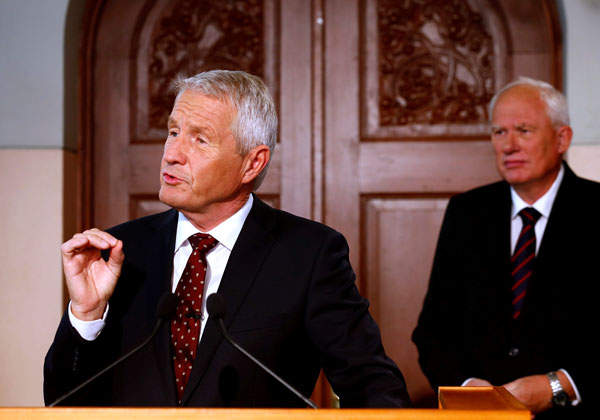Chemical weapon watchdog wins Nobel
Updated: 2013-10-11 23:05
(China Daily/Agencies)
|
|||||||||||
 |
|
The chairman of the Norwegian Nobel Committee, Thorbjorn Jagland, announces the winner of the Nobel Peace Prize at the Nobel Institute in Oslo, Norway, on Friday. Heiko Junge / Associated Press |
The Organization for the Prohibition of Chemical Weapons won the Nobel Peace Prize on Friday for working to eliminate the scourge that has haunted generations from World War I to the battlefields of Syria.
The OPCW was formed in 1997 to enforce the Chemical Weapons Convention, the first international treaty to outlaw an entire class of weapons. Based in The Hague, Netherlands, it has largely worked out of the limelight until this year, when the United Nations called on its expertise to help investigate alleged chemical weapons attacks in Syria.
"The conventions and the work of the OPCW have defined the use of chemical weapons as a taboo under international law," the Nobel committee said. "Recent events in Syria, where chemical weapons have again been put to use, have underlined the need to enhance the efforts to do away with such weapons."
Friday's award comes just days before Syria officially joins as the group's 190th member state. OPCW inspectors are already on a UN-backed disarmament mission to verify and destroy Syria's arsenal of poison gas amid a raging civil conflict.
Fayez Sayegh, a lawmaker and member of President Bashar Al-Assad's ruling Baath party, said awarding the prize to OPCW underscores "the credibility" of the Damascus government and its intentions to destroy its toxic arsenal. He said the organization should work to rid the entire Middle East — including Israel — of weapons of mass destruction.
OPCW Director-General Ahmet Uzumcu said the award was a recognition of the group's work for global peace in the past 16 years.
"I know that the Nobel Peace Prize will help us in fact to promote the universality of the (Chemical Weapons) Convention in the next months. Hopefully we will be able to achieve it soon," Uzumcu said.
There was no immediate report on what the organization would do with the $1.2 million prize.
By giving the peace award to an international organization, the Nobel committee found a way to highlight the devastating Syrian civil conflict, now in its third year, without siding with any group involved. The fighting has killed an estimated 100,000 people and forced millions of Syrians to flee their homes and country, according to the UN.
Syria was scheduled to formally become a member of the organization on Monday.
The first OPCW inspection team arrived in Syria last week, followed by another team this week. They have already begun to oversee the first stages of destruction of Syria's chemical weapons.
The struggle to control chemical weapons began in earnest after World War I, when agents such as mustard gas killed more than 100,000 people and injured a million more.
The 1925 Geneva Convention prohibited the use of the weapons but the production or storage of chemical weapons wasn't outlawed until the Chemical Weapons Convention came into force in 1997.
According to the OPCW, 57,740 metric tons, or 81.1 percent, of the world's declared stockpile of chemical agents have been verifiably destroyed.
An OPCW report earlier this year said the United States had destroyed about 90 percent of its stockpile of such weapons, Russia had destroyed 70 percent of its stocks and Libya 51 percent.
The OPCW did not figure prominently in this year's Nobel speculation, which focused mostly on Malala Yousafzai, the 16-year-old Pakistani girl who was shot in the head by the Taliban last year for advocating education for girls.
AP—AFP
Related Stories
Author Alice Munro wins Nobel 2013-10-11 07:25
US trio wins Nobel chemistry prize 2013-10-10 11:25
Nobel prize winner: Research is my passion 2013-10-09 19:59
3 US scientists win Nobel chemistry prize 2013-10-09 19:44
Higgs and Englert win physics Nobel prize 2013-10-09 03:15
Today's Top News
Edward Snowden meets father in Russia
China mulls adjusting rules on bank liquidity
Currency swap signed with the EU a 'landmark'
Dozens dead in shipwreck off Sicily
Obama meets with Republicans
OPCW wins Nobel Peace Prize
Trending news across China
Yuan clearing bank in sight
Hot Topics
Lunar probe , China growth forecasts, Emission rules get tougher, China seen through 'colored lens', International board,
Editor's Picks

|

|

|

|

|

|





